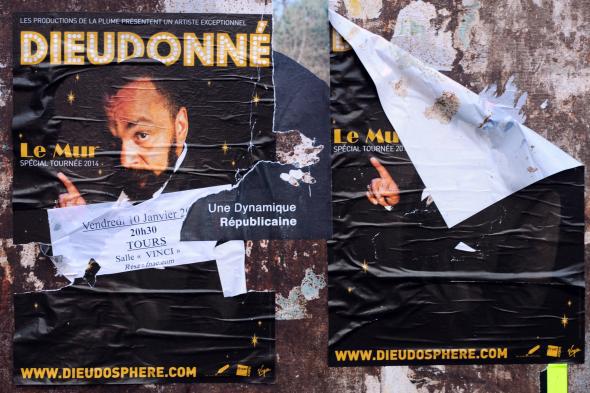The French comedian Dieudonné has been arrested for a Facebook post from Monday in which he wrote, “Tonight, as far as I’m concerned, I feel like Charlie Coulibaly,” mashing up the popular “Je suis Charlie” slogan with a reference to the gunman who took hostages at a kosher grocery store in Paris last Friday. In part the arrest could be seen as part of the beefed-up security measures France has put in place in the wake of last week’s violence. But it’s also not the first time Dieudonné has fallen afoul of the law.
The comedian has been convicted of inciting racial hatred multiple times for comments disparaging Jews and denying the Holocaust. The biracial comedian—his father is from Cameroon—was once part of a comedy duo with the Jewish comedian Élie Sémoun, known for edgy but popular bits mocking cultural differences. But he split with Sémoun in the late 1990s, and his comedy has since veered from Borat-style mockery to outright anti-Semitism.
Dieudonné has befriended former National Front leader and Holocaust denier Jean-Marie Le Pen and appeared onstage with the Holocaust-denying historian Robert Faurisson. In 2012 he released a widely panned film, L’Antisemité, which includes an extended segment mocking Auschwitz.
The comedian has also become known for his signature gesture, the quenelle, which critics say is an inverted Nazi salute but which he says is a nonracist symbol of nonconformity. If Americans have heard of Dieudonné, it’s likely through the French San Antonio Spurs star Tony Parker, who apologized in 2013 for doing the gesture with the comedian in a photo. (Parker said he wasn’t aware of its significance.) The French Premier League star Nicolas Anelka was suspended for five games last year for doing the quenelle as a celebration after a goal.
Loathsome as many of Dieudonné’s remarks are, there’s something ironic in the fact that a government whose leaders were marching last week in defense of the right to offensive expression are this week arresting people for it.
Freedom of speech is protected under French law, but as in several other European countries, there are a few more exceptions to that freedom than in the United States. France’s main piece of hate-speech legislation prohibits incitement to discrimination, hatred, or violence based on race, ethnicity, religion, nationality, or sexual orientation. Additionally, a controversial terrorism law passed last year bans material that incites or glorifies terrorism. (As the Dieudonné case shows, authorities are taking that rule pretty seriously this week.)
A number of high-profile figures have been charged under the law, including Le Pen, who has been fined multiple times for remarks about Muslims and the Roma. His daughter, current National Front leader and presidential hopeful Marine Le Pen, may also face charges over remarks comparing Muslim street prayers to the Nazi occupation of France.
Fashion designer John Galliano was fined for a drunken anti-Semitic rant in 2011. Actress and animal rights activist Brigitte Bardot has been fined for insulting Muslims while criticizing halal slaughtering practices. Charges were filed against Bob Dylan last year for a typically Dylanesque tangent in a Rolling Stone interview in which he (sort of) compared Croatians to Nazis. The case was dismissed on the grounds that he hadn’t intended for the remarks to be published in France. Charges were also filed and then dismissed in 2001 against author Michel Houellebecq, who appeared on the last issue of Charlie Hebdo before the attack, for an interview in which he called Islam “the most stupid religion.”
Not surprisingly, the provocateurs at Charlie Hebdo have themselves been targeted under the law. In 2006, Muslim groups tried filed racism charges against the paper for republishing the Danish Mohammed cartoons. Then-President and noted Charlie critic Jacques Chirac offered the groups the services of his personal lawyer, but the charges were eventually dropped. Cartoonist Siné was also charged in 2009 for a cartoon implying that Nicolas Sarkozy’s son was converting to Judaism for financial reasons. He was eventually fired from the magazine after saying “I’d rather cut my balls off” than apologize for the cartoon.
Sensitivities are understandably high after last week’s attack, and certainly Dieudonné’s comments are worthy of denunciation. But it would be unfortunate if the byproduct of an attack on free speech was further legal restrictions on it.
